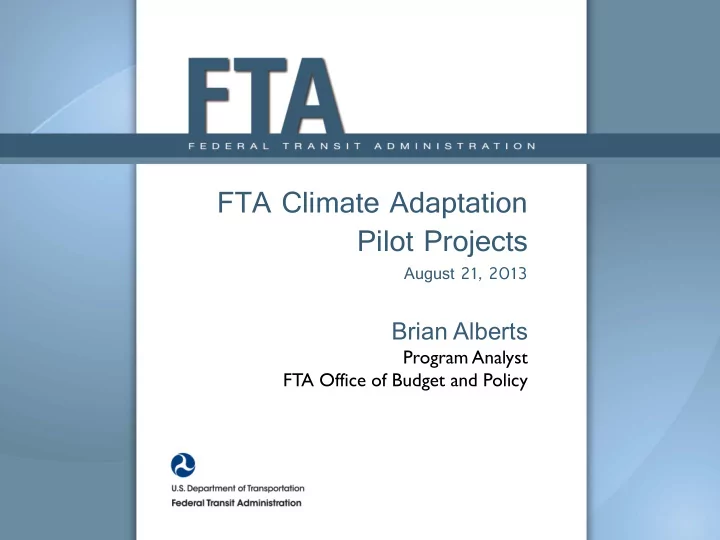

FTA Climate Adaptation Pilot Projects August 21, 2013 Brian Alberts Program Analyst FTA Office of Budget and Policy
FTA Climate Adaptation Initiative Policy Framing: Dear Colleague Letter • and Policy Statement describe climate impacts on FTA goals and commits FTA to action • Synthesis: “Flooded Bus Barns and Buckled Rails” Report examines climate impacts, strategies, and risk management Outreach: Workshops and webinars • – March 2012 FTA Workshop on Climate Adaptation – Have held four peer exchange webinars Pilots: Delve more in-depth on climate • impacts on particular transit agencies, potential adaptation strategies, and mainstreaming into transit practices www.fta.dot.gov/adaptation 2
Past and Current FTA Adaptation Activities • APTA Sustainability Workshops in August 2011 and August 2012 • March 2012 Workshop on Climate Adaptation • Webinars (Peer Exchanges) – Held 4 webinars with the pilot projects • Presentation by Deputy Administrator McMillan and breakout session at the 2013 APTA Sustainability Workshop • FTA Climate Adaptation Assessment Pilot projects 3
Objectives of the Pilot Projects • Increase knowledge of how transit agencies can adapt to climate change (including costs and savings, strategies, and mainstreaming into transit practice) Advance the state of the practice in adapting transit assets and operations to the • impacts of climate change • Gather lessons learned for application to other transit providers (applicability to the industry) Need to be able to tell the story to other transit agencies by having concrete examples from the pilots: • Climate change adaptation is another factor we should include in asset management Adaptation is just better planning • Planners must think about future conditions • Saves money in the long run • Some are already doing this and having success • BART Oakland West Portal 4
FTA Climate Adaptation Pilots 7 Pilots - $1 million total - Completion - August 2013 Sound Transit Seattle BART CTA SEPTA / ICF San Francisco Chicago Philadelphia MARTA / Georgia Tech Atlanta LACMTA Los Angeles Metro (Houston) / Island Transit (Galveston) / HART (Tampa) / Texas A&M Transportation 5 Institute AK & HI not to scale
General Approach for the FTA Climate Adaptation Pilot Projects • Identify climate hazards and potential climatic events • Characterize risk on transit assets and operations • Develop initial adaptation strategies • Link strategies to organizational structures • Final Report Source: FTA “Flooded Bus Barns and Buckled Rails” Report 6
FTA Climate Adaptation Pilots BART ($150,000) – Has examined sea level rise, downpours, and flooding, and the potential • risks these climatic events pose for four stations in the East Bay/Oakland (including Oakland West Portal, Oakland Coliseum, Fruitvale, & Lake Merritt). Developed cost-benefit matrices. • CTA ($159,500) – Conducted three tasks, including: a survey of system vulnerabilities, adaptation strategies, and implementation into standard business practices. CTA also looked at various build and no-build scenarios and conducted a lifecycle cost analysis to determine the potential costs and benefits of each adaptation strategy over time. MARTA ($175,000) – Focused on transit asset management and integrating climate • adaptation into an agency’s asset management practices. They further identified various adaptation strategies and the costs of each potential strategy. CTA O’Hare Tunnel Ventilation Shaft 7
FTA Climate Adaptation Pilots • LACMTA ($175,000) – Leveraged findings from their 2012 Climate Action Plan and conducted four tasks, including: integration of adaptation principles into LA Metro’s Environmental Management (EMS) system, development of a tool to evaluate climate risks, development of a set of metrics to assess LA Metro’s progress in addressing adaptation; and outreach to stakeholders. • SEPTA ($144,087) – Examined the Manayunk/Norristown commuter rail line and researched current and future climate hazards, key vulnerabilities, adaptation strategies, and lessons learned (including the agency’s response to Hurricane Sandy). Sound Transit ($105,000) – Conducted workshops with • maintenance and operations staff to determine the agency’s vulnerability to climate change, potential system-wide risks, and adaptation strategies. • Gulf Coast pilot (Houston Metro, Tampa HART, and Galveston Island Transit) ($146,200) – Determined climate impacts along the gulf coast, surveyed agencies to ascertain the severity of past weather events, and proposed adaptation strategies by conducting three case studies in the region. BART Lake Merritt Station 8
FTA Climate Adaptation Pilots Next Steps • Draft Final Reports were due to the FTA on May 31, 2013 – FTA staff has reviewed all reports and provided edits/comments • A summary report is currently being written by FTA staff that synthesizes the information and adaptation strategies from each of the pilots’ final reports • Final reports will be published on the FTA web site in the fall of 2013 9
Federal Transit Administration www.fta.dot.gov www.fta.dot.gov/adaptation
Recommend
More recommend